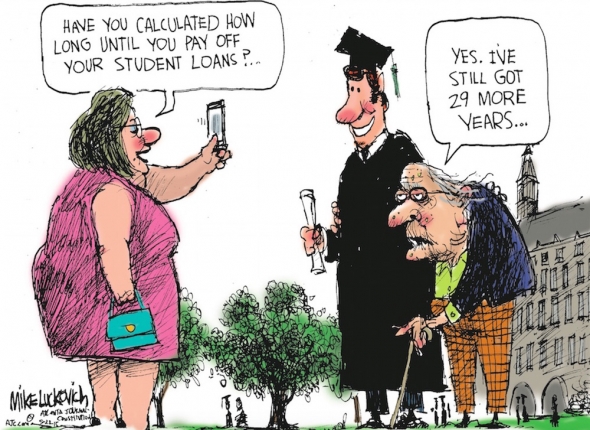The Education Secretary Wants Colleges to be More Accountable

By:
The cost of a college education in America is too damn high, U.S. Secretary of Education Arne Duncan said on Monday.
Duncan spoke to students at the University of Maryland this week, explaining that the country's college system has failed to provide the majority of people with an affordable, high-quality education. He argued that "debt-free degrees" are "only part of the solution" to this problem and that federal and state governments should hold universities to a higher standard.
"Make no mistake: Our administration will not let up on our efforts to help more students pay for college, to break the upward cycle of cost and to crack down on bad actors that take advantage of students," Duncan said.
"But as a nation, we must go further. We must reset the incentives that underpin the system so the focus is on the outcome that matters—completing a quality degree at a reasonable cost. And we must have the courage to embrace innovations that meet the needs of a student body that has changed enormously in recent years."
In the last three decades, tuition rates have more than doubled in the U.S., according to the National Center for Education Statistics. Part of the reason for this dramatic climb is the expansion of university administration. Though professor salaries have remained relatively stable (which is to say, low), well-paid administrative positions have been on the rise—growing 60 percent between 1993 and 2009, as the Department of Education assessed.
 Mike Luckovich - truthdig.com
Mike Luckovich - truthdig.com
"The rapid increase in college enrollment can be defended by intellectually respectable arguments," the New York Times reported. "Even the explosion in administrative personnel is, at least in theory defensible. On the other hand, there are no valid arguments to support the recent trend toward seven-figure salaries for high-ranking university administrators, unless one considers evidence-free assertions about 'the market' to be intellectually rigorous."
But Duncan contended that, for many politicians, an emphasis on cost-cutting policies has distracted from the larger issue at hand: the payoff of a college degree. He called for credential programs that offer a "clear path to economic security and success," and said that universities should be held accountable to students as well as taxpayers for the long-term outcomes of the degrees they provide.
Student debt is another problem the official addressed in his speech. Duncan acknowledged that it was increasingly difficult for most Americans to afford a high-quality education and that many have been forced to accept federal or private loans that could take years—sometimes decades—to repay.
The rate of loan defaults for students that don't graduate is three times higher than those that do, for example, and that translates into future economic woes, both for the individual borrower and the market as a whole.
"This is not just an economic imperative, but a moral necessity," Duncan stated. "Ensuring the opportunity of college success for all students who are willing to work hard is a core tenet of the American covenant... The decisions we face here will define our generation. In the choices we make, we decide what kind of country we are, and who gets to share in the nation's success."
